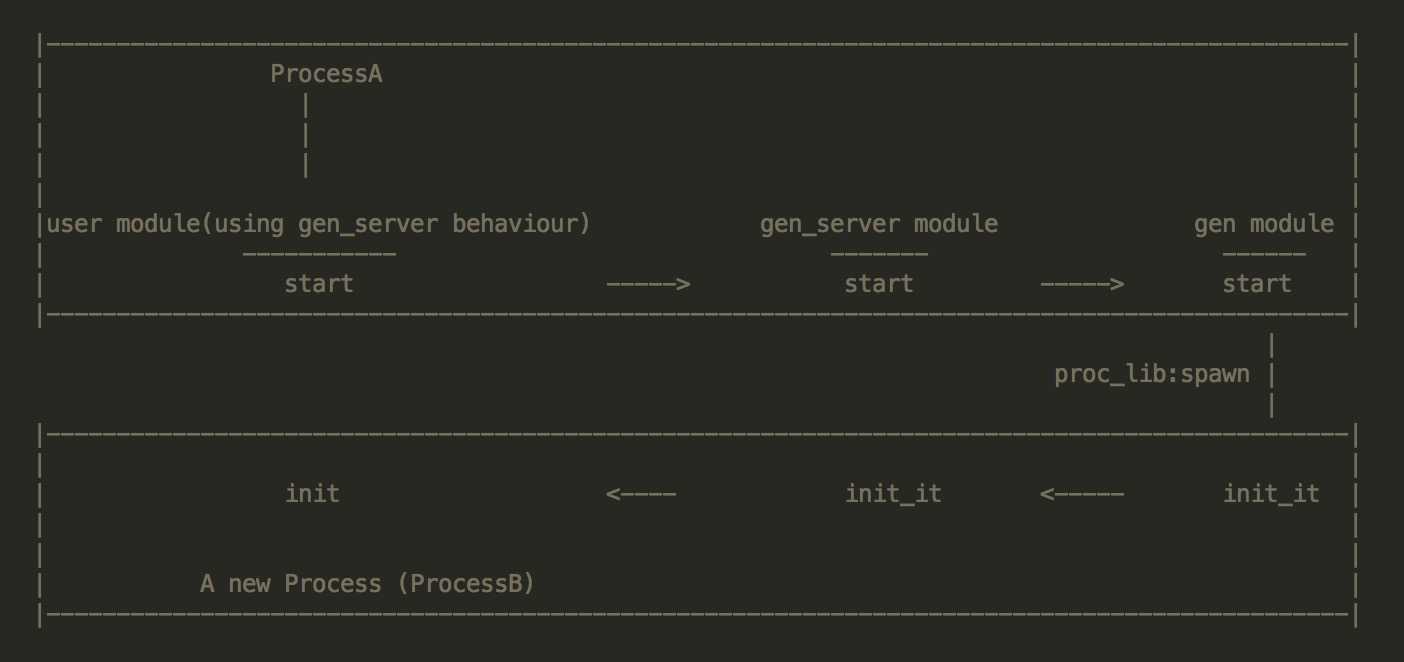标签:
在分析完gen module 之后,就可以开始进入gen_server 的主体module 了.gen_server 的主体 module 暂不涵括terminate, hibernate, debug trace 相关的内容,这些会单独拉出来分析.
gen_server 主要包括start 初始化部分, MAIN loop. 其中MAIN loop 为gen_server的主体结构, 其中,处理Label 为‘$gen_call‘ (也就是handle_call)的消息使用handle_msg 处理, Label为‘$gen_cast‘(也就是handle_cast)的消息以及无Label(handle_info)的消息经由handle_msg最终交给try_dispatch 函数.
gen_server start 是由外部进程调用gen_server module 的start/start_link 函数,用以创建新的gen_server behavior 的进程. 在标准的Erlang application 中,一般是由supervisor 角色发起. start 的流程见下图

如图中所示, ProcessA 是gen_server start 的调用者, 通过user module 的start/start_link 函数, 调用gen_server module 中的start, 继而调用gen module 中的start. 在gen module中, 由proc_lib:spawn 创建新的进程(ProcessB), 并以此调用init_it(gen); init_it(gen_server) ; init(user module) 完成gen_server behavior 进程的初始化.
都成说,gen_server behavior 的user module init 函数尽可能快的返回, 不要做任何阻塞性的操作.
在gen_server 的init_it 函数中, Mod:init 返回之后, 会调用proc_lib:init_ack/2, 用于向 start 的调用者返回结果
1 init_it(Starter, self, Name, Mod, Args, Options) -> 2 init_it(Starter, self(), Name, Mod, Args, Options); %% 注意, 如果使用nolink start 时, Parent 就是自己 3 init_it(Starter, Parent, Name0, Mod, Args, Options) -> 4 Name = name(Name0), 5 Debug = debug_options(Name, Options), 6 case catch Mod:init(Args) of 7 {ok, State} -> 8 proc_lib:init_ack(Starter, {ok, self()}), %% 向调用者返回结果 9 loop(Parent, Name, State, Mod, infinity, Debug); 10 {ok, State, Timeout} -> 11 proc_lib:init_ack(Starter, {ok, self()}), 12 loop(Parent, Name, State, Mod, Timeout, Debug); 13 …………
所以,尽可能快的返回,不在Mod:init中做任何阻塞以及耗时性的操作.
但是,很多情况下,在Mod:init 处理过程中,是用于与外部资源(如:DB,MQ等)创建链接,而这些操作很难确定其耗时性,咋办?牛逼的Erlang大神 Ferd 在其 Erlang in Anger (国内有翻译版:硝烟中的Erlang——Erlang 生产系统问题诊断、调试、解决指南) 中提供了一种方式
The following code attempts to guarantee a connection as part of the process’ state:
1 init(Args) -> 2 Opts = parse_args(Args), 3 {ok, Port} = connect(Opts), %% 这种在init 函数中执行connect的方式不可取 4 {ok, #state{sock=Port, opts=Opts}}. 5 [...] 6 handle_info(reconnect, S = #state{sock=undefined, opts=Opts}) -> 7 %% try reconnecting in a loop 8 case connect(Opts) of 9 {ok, New} -> {noreply, S#state{sock=New}}; 10 _ -> self() ! reconnect, {noreply, S} 11 end;
Instead, consider rewriting it as:
1 init(Args) -> 2 Opts = parse_args(Args), 3 %% you could try connecting here anyway, for a best 4 %% effort thing, but be ready to not have a connection. 5 self() ! reconnect, %% 给self 发送消息,替代在init 时connect的耗时/阻塞操作 6 {ok, #state{sock=undefined, opts=Opts}}. 7 [...] 8 handle_info(reconnect, S = #state{sock=undefined, opts=Opts}) -> 9 %% try reconnecting in a loop 10 case connect(Opts) of 11 {ok, New} -> {noreply, S#state{sock=New}}; 12 _ -> self() ! reconnect, {noreply, S} 13 end;
注意: 第一种方式不可取.
使用proc_lib:init_ack 之后, gen_server init_it 会调用loop 进入gen_server 的MAIN loop 流程中. MAIN loop 使用receive 用以接收‘$gen_call‘, ‘$gen_cast‘ 以及其他的message, 紧接着交由 decode_msg 函数进行处理.
1 %%% --------------------------------------------------- 2 %%% The MAIN loop. 3 %%% --------------------------------------------------- 4 loop(Parent, Name, State, Mod, hibernate, Debug) -> 5 %% 这个坑在说hibernate 的时候再填 6 proc_lib:hibernate(?MODULE,wake_hib,[Parent, Name, State, Mod, Debug]); 7 loop(Parent, Name, State, Mod, Time, Debug) -> 8 Msg = receive 9 Input -> 10 Input 11 after Time -> 12 timeout 13 end, 14 decode_msg(Msg, Parent, Name, State, Mod, Time, Debug, false). 15 16 wake_hib(Parent, Name, State, Mod, Debug) -> 17 Msg = receive 18 Input -> 19 Input 20 end, 21 decode_msg(Msg, Parent, Name, State, Mod, hibernate, Debug, true). 22 23 decode_msg(Msg, Parent, Name, State, Mod, Time, Debug, Hib) -> 24 case Msg of 25 %% 这个坑在说sys trace/get_status 的时候填 26 {system, From, Req} -> 27 sys:handle_system_msg(Req, From, Parent, ?MODULE, Debug, 28 [Name, State, Mod, Time], Hib); 29 %% 这个坑在说 terminate 的时候填 30 {‘EXIT‘, Parent, Reason} -> 31 terminate(Reason, Name, Msg, Mod, State, Debug); 32 _Msg when Debug =:= [] -> 33 handle_msg(Msg, Parent, Name, State, Mod); 34 _Msg -> 35 Debug1 = sys:handle_debug(Debug, fun print_event/3, 36 Name, {in, Msg}), 37 handle_msg(Msg, Parent, Name, State, Mod, Debug1) 38 end.
在上面的代码片段中, L8 正是receive self 或外部进程的message, L23 是decode_msg 函数的入口, 在L33和L37 处调用handle_msg 函数进一步对msg消息进行处理.代码比较简单,没必要一行一行分析了.
call 在上一篇blog中已经提到, cast以及abcast 的实质就是调用erlang:send bif, 最终调用erts beam 下的dist.c .
multi_call 牵扯到多node , Erlang stdlib 中pg2 module 就主要使用multi_call 同步各自node 上ets 表的信息. 如:
1 create(Name) -> 2 _ = ensure_started(), 3 case ets:member(pg2_table, {group, Name}) of 4 false -> 5 global:trans({{?MODULE, Name}, self()}, 6 fun() -> 7 gen_server:multi_call(?MODULE, {create, Name}) 8 end), 9 ok; 10 true -> 11 ok 12 end.
multi_call 调用 do_multi_call 函数, do_multi_call 使用Middleman process . Middleman process 负责给各node 发送 Label 为 ‘$gen_call‘ 的消息并等待各node 的结果返回.
1 %% Middleman process. Should be unsensitive to regular 2 %% exit signals. The sychronization is needed in case 3 %% the receiver would exit before the caller started 4 %% the monitor.
最终, 通过exit 的方式返回给主调用进程, 而主调用进程会通过monitor/receive {‘DOWN‘ ...} 的方式接收结果.
注意: Middleman process 需要monitor 目标node, 如果nodedown, 即会采取 call 失败的流程进行处理.
Erlang generic standard behaviours -- gen_server module
标签:
原文地址:http://www.cnblogs.com/--00/p/4271982.html